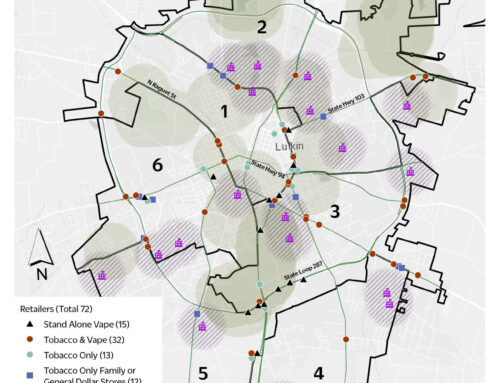Tobacco control policies must be formulated and examined with health equity at the forefront to directly address health inequities among Black Americans and other marginalized communities. Even the best intentioned tobacco product regulation policies may reinforce racism and the inequitable impact on marginalized communities. We must create more effective policies at both the federal and local level that address ongoing disparities, reduce the burden on Black communities, and strive for health equity for all.
Health equity means that everyone has a fair and just opportunity to be as healthy as they can be, and this requires reducing and removing structural barriers and obstacles that impact health. Structural elements that disadvantage certain racial groups through institutional racism, along with industry targeting, can impact exposure, availability, and access to both healthy and harmful products.
We know that the Black community has been targeted by the tobacco industry for decades with marketing tactics and point-of-sale strategies such as advertising, product availability and pricing at retail stores. This targeting has resulted in disparities in tobacco product use, such as the prevalence of the use of menthol cigarettes among Black Americans, and caused disproportionate harm.
There has historically been a lack of urgency surrounding policies that would benefit Black communities, and policies that restrict menthol do not seem to have the same publicity and support as other types of policies. Policies to protect youth from e-cigarette flavors have received considerable support and attention, and while the youth vaping epidemic is critical, these policies disproportionately benefit white youth as they are more likely to use electronic products.
Using an equity viewpoint, we can start to understand how even the best intentioned tobacco product regulation policies may reinforce racism and the inequitable impact on marginalized communities. For example, targeted marketing of Black communities is an ongoing strategy of the tobacco industry, menthol was exempted from the 2009 Family Smoking Prevention and Tobacco Control Act flavored cigarette ban, and there is a lack of flavor tobacco product restrictions on cigars. While 274 localities across the United States have placed restrictions on flavored tobacco products since 2019, the majority of these flavor restrictions have excluded menthol. In April this year a long overdue announcement was made by the FDA that they are proposing product standards to prohibit menthol as a characterizing flavor in cigarettes and prohibit all characterizing flavors in cigars.
When creating policies, it is critical to consider equity issues to achieve equitable outcomes. Policies that focus on equality instead of equity, such as reducing all available tobacco retailer licenses by half, do not address the existing disparity of higher retailer density in certain neighborhoods. Other policies like banning the sale of tobacco products at pharmacies may disproportionately reduce retailers in wealthier neighborhoods, as there are fewer pharmacies in neighborhoods with more Black residents. Mapping tobacco retailers and other locations like schools and parks can be a useful tool to visualize the impact of policies before they are enacted and raise awareness about disparities. (Check out some examples from the six states that participated in the Geographic Surveillance Learning Collaborative for Comprehensive Cancer Control and National Tobacco Control Programs)
In a recent paper on centering equity in flavored tobacco ban policies, the authors recommend examining the entire policy process through an equity lens, including policy formulation, adoption, enforcement, and evaluation. They advocate for partnering and agenda-setting with communities, examining policy language for exemptions, determining the reach of policy on different populations, and assessing the equitable nature of policy implementation and enforcement. The guidelines shared in Tobacco Control Enforcement for Racial Equity: Decriminalizing Commercial Tobacco – Addressing Systemic Racism in the Enforcement of Commercial Tobacco Control may be a starting point for helping advance equitable enforcement practices related to purchase, possession, sale and distribution of tobacco products.
Equity needs to be at the forefront of public health in order to address systemic issues that have gone on for too long. We need to continue to address racism at its roots and understand the history and consequences. With a health equity lens, we can create more effective policies at both the federal and local level that address ongoing disparities, reduce the burden on Black communities, and strive for health equity for all.





